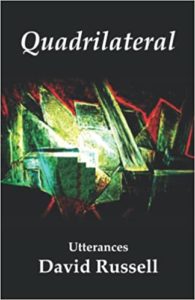David Russell produces a feast of language in poetry
The first thing you notice about the poems of Quadrilateral: Utterances by David Russell is the language. It is a language of word pictures and images that cascade one after the other in a virtual torrent of imagination.
The first poem, “Hard Times of Old England,” is the first of 47 poems and a good example. It’s a poem about Brexit, and you think, oh, no, more politics. It is political. But it presents images of trucks choking ports as they crowd to gain entry, rotting fish, services straining for workers, and a government content to bumble its way through. Regardless of what you might think about Brexit, Russell floods the reader’s mind with pictures that force you to confront what it means.
The “quadrilateral” of the title refers to the four divisions of the collection — lyrics, eros, dystopia, and prose. The poems cover broadly diverse subjects, from Brexit and clinical psychiatry to eco-thunderstorms, earthquakes, and Samuel Beckett. What they share is Russell’s stunning use of imagery and language. Pictures loom large in these poems, as does the poet’s almost playful use of nouns as verbs, verbs as nouns, and language as a kind of collection adjective and adverb — with a few interjections thrown in for good measure. The poem “Dark Dream,” from the “Dystopia” section, demonstrates how Russell makes language work for what he’s trying to say.
Dark Dream

to make their dead messages,
to find their story-forms,
glinting chitin delighting, reeding the pitches.
Down went the depths, encased and ethered,
numbing us to touch the greater.
Down went the coils of lit signs,
and made the questions dark and known,
and made the answers dark and known
and wisped the forests harshly blown
and came to seek and find.
Up rushed the fugitive bearer,
sheerly slithering, faces swarming,
moss-treachery to bounce —
to find the friendly start-swathes,
be one of them and stay.
Up rushed the swarms of shadow-things,
Piling where they could not climb,
And moaning — in a dolphin-pitch:
“Be one of us, for now we rim the cup of rock so rare receiving rain;
be one of us; we are the lance’s strength and goal; be one of us —
we go in peace yet never neutral; be one of us — we are the stars above
where we are not; be one, be us, be known, begone — Belong!”

David Russell
Russell has published works of poetry, speculative fiction, literary criticism, and romance. His previous poetry works include Prickling Counterpoints, the chapbook An Ever River, and a translation of the 16th century epic Spanish poem The Araucana. He’s also a singer-songwriter and guitarist, producing a number of CD albums. He lives in the United Kingdom.
Poets are meant to be read, but in Quadrilateral: Utterances, they’re also meant to be spoken. Read them aloud, and you discover a whole new dimension to the poetry. You speak their alliteration, their sounds that resonate and then jar and sometimes get you in a linguistic tongue-twister. It’s a feast of language that leaves you both sated and hungry for more.
Related:
David Russell’s Altamira Home Concert
Photo by ™ Pacheco, Creative Commons, via Flickr. Post by Glynn Young.
How to Read a Poem uses images like the mouse, the hive, the switch (from the Billy Collins poem)—to guide readers into new ways of understanding poems. Anthology included.
“I require all our incoming poetry students—in the MFA I direct—to buy and read this book.”
—Jeanetta Calhoun Mish
- Poets and Poems: Mary Brown and “Call It Mist” - September 18, 2025
- “Horace: Poet on a Volcano” by Peter Stothard - September 16, 2025
- Poets and Poems: The Three Collections of Pasquale Trozzolo - September 11, 2025


Leave a Reply